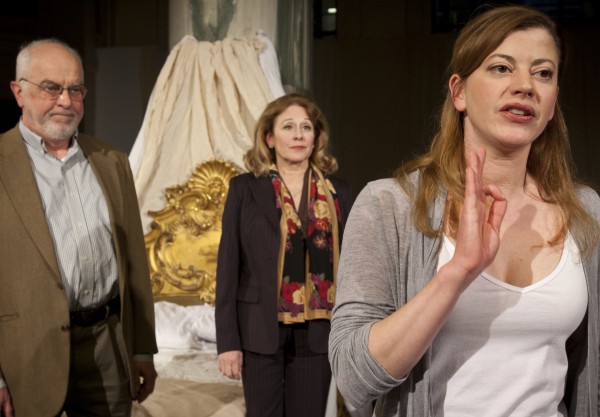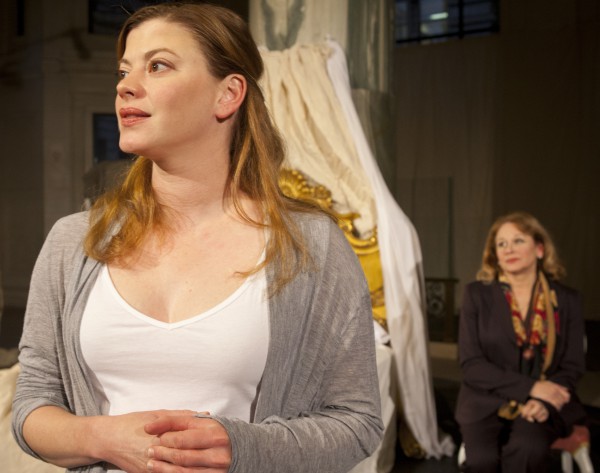‘Madagascar’ at Quantum: a Midwinter’s Tale of a Strange Fall

June (Melinda Helfrich, foreground) wants to move forward but she is obsessed with the past, where Nathan (Larry John Meyers) and Lilian (Helena Ruoti) are frozen by the choices they’ve made or failed to make.
One of the oldest themes in drama is the downfall of a great family. In such ancient Greek plays as the Oresteian Trilogy, or in Shakespeare’s King Lear, it is a royal family that comes to grief. In J.T. Rogers’s Madagascar—now being performed by Quantum Theatre—we follow the misfortunes of an upper-class American family, members of the wealthy intelligentsia, who seemingly had it all but somehow managed to screw it up.
And what exactly went wrong in the lives of the once-dazzling Doyles? That is what mother Lilian (Helena Ruoti) and daughter June (Melinda Helfrich) are trying to figure out with the help of an old family friend, Nathan Sanders (Larry John Meyers). These three tell their tales in a series of interwoven flashbacks, delivered as monologues. Rarely do Lilian, June, and Nathan interact on stage. Mostly they take turns stepping forward to describe events from the past, or to reflect on how they felt at the time … or on what it might have meant, or what they could have done differently.
This is unconventional storytelling but easy to follow. When the device works well, as it often does, you get several things happening in parallel. The characters reveal themselves gradually. The forking paths of their stories converge into tragic flash points—some of which you can see taking shape, ominously, but some of which come as a shock. And, as the larger story comes together from these fragments, the outlines keep shifting.

Like everyone in the play, Nathan is racked by feelings of guilt. And being an economist, he learns how worthless the sentiment is: guilt may cost plenty but it buys you nothing.
Each piece that’s added seems to create a new puzzle. Each monologue discloses some deeper, messier aspect of a character’s psyche. Near the start, for instance, Nathan is introduced to us by Lilian as a wonky professor who has the amusing but annoying habit of boring other people to death with factoids and anecdotes that he always prefaces with the line, “This you’ll find interesting …” Sure enough, when it is Nathan’s turn to speak, he begins just that way. Yet as we go along, it turns out he’s much more than a pedantic dud. Like a tortured wolf in nerd’s clothing, he is passionate and conflicted, a good guy/bad guy who, despite best intentions, lets himself be sucked into the tempest of the Doyle family’s simmering dysfunctions.
The foregoing may sound vague, but I am trying to avoid spoilers. The surprises begin early in Madagascar and accelerate toward the end. We hear how people’s lives have been uprooted, thrown off course, and in some cases brought to untimely ends. As the stories deepen, the stage becomes filled with ghosts.
In fact, two central players in the drama remain ghostly presences throughout. They never appear on stage, existing only in the stories told. Let’s meet them briefly while completing our synopsis of this grim winter’s tale.
Anatomy of a Disappearance
At its apex, the Doyle family had four members, each one gracious and good-looking and accomplished. Arthur, the paterfamilias, was a brilliant economist. His lovely wife Lilian played the part of the cultured globetrotting spouse perfectly, and they had two gifted children just entering adulthood: June and her twin brother Gideon Paul.
All was not perfect beneath the surface, however. For example, the famous Arthur had been largely an absentee husband and dad. Then shortly after he took ill and died, in late middle age, the son absented himself as well—literally vanishing after the funeral, creating a missing-person mystery that runs through the play.
Where did Gideon Paul go? To Madagascar, maybe, to work with the needy. (The island nation is one of the world’s poorest.) Why did he leave? Because “people can’t be trusted,” he’d said, and because “so much of what I believed in is a lie.” Here he may have been referring to multiple sore spots, such as intimations that his mother had been unfaithful to father, his suspicions that the lofty science of economics doesn’t do much to help the un-lofty, and/or guilt at being a member of the privileged class while the masses suffer.

“That which we want most, we do.” June is quoting her missing brother, and in a play where the characters struggle mightily to explain human behavior—both their own and that of others—this line comes closest to saying it all.
All these reasons are either mentioned outright or hinted at through cryptic clues. One can even find symbolic evidence in the young man’s names. His mother had named him Gideon—and the Biblical Gideon, the hero of Judges 6-8, was a destroyer of false idols. But the boy preferred (and was usually called by) his middle name, Paul—the name of the New Testament hero who left his old life behind and became a traveling evangelist.
Then again, Gideon-slash-Paul may have flown the coop mainly to escape an increasingly toxic home environment. As one woman in the audience pointed out after the show, the boy’s mother and his twin sister had been doting on him to an unhealthy degree. Perhaps he just needed to find an identity of his own.
Whatever the reason or interpretation, the search for Gideon/Paul becomes a recurring story line that ties other subplots together. June is so consumed by her brother’s disappearance that she spends two years scouring the world to look for him, finally settling in Rome to work as a tour guide. Perhaps in the Eternal City, hope springs eternal that Paul’s traces can be found?
Places and People
All of Madagascar unfolds in a single setting: the hotel room in Rome where June has been staying. We learn that both Lilian and Nathan also have visited this room at various times, and so their on-stage manifestations gather here for a night of ghostly remembrance and reflection. Quantum has staged the play in the ornate lobby of The Carlyle, downtown. The space’s grand columns and decorative trimming provide an apt setting for the luxurious bed and draperies that frame the action.
More to the point, the actors are on point. Helena Ruoti as Lilian is grand at acting the grande dame. Melinda Helfrich (seen previously in Quantum’s The Howling Miller) plays a strong June, and Larry John Meyers, the sole male performer, puts a gender’s worth of spectacle into the bespectacled Nathan.
If you enjoy psychodrama with undertones of mystery and haunting, Madagascar may be your cup of tea for this dark winter season.
Closing Credits
J.T. Rogers, a Brooklyn-based playwright, composed Madagascar in 2004. Quantum Theatre’s production is the Pittsburgh premiere and is directed by Sheila McKenna. Wed.-Sun. through Feb. 22 at The Carlyle, 306 Fourth Ave., Downtown. (Please note that closing night, Feb. 22, is a Saturday.) For times and tickets, visit Quantum or call 412-362-1713.
Photos Courtesy of Quantum Theatre and Heather Mull
Mike Vargo, an experienced, longtime writer and editor based in Pittsburgh, has himself performed on stage but “not very well,” he says. So he sticks to writing about it.
Share on Social Media
Follow Entertainment Central
Latest Stories
Sign up for the EC Newsletter







